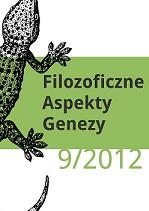Zarys modelu poziomów analizy w badaniach relacji nauki i religii
The Sketch of the Model of Levels of Analysis in the Studies of Relation Between Science and Religion
Author(s): Piotr BylicaSubject(s): Philosophy
Published by: Instytut Filozofii, Uniwersytet Zielonogórski
Keywords: levels of analysis; science and religion; Christian theism; naturalism; interventionism; God of the gaps; theistic naturalism
Summary/Abstract: I propose the model of division of statements on the reality that differentiate them according to the degree of their empirical character. The following model is supposed to facilitate analysis of propositions on the relation of science and religion. One extreme are metaphysical statements (in the logical empiricism’s view of metaphysics) that are empirically neutral. The other extreme are empirical statements characterized by the maximum level of testability. It is demonstrated how ignoring the levels of analysis influences some positions on science and religion. Problematic positions are named ‘too easily conflicting’ and ‘too easily reconciliating’ science and religion. In the first case I present negative reception of scientific theory of evolution by Michał Chaberek on the basis of ontological assumptions that are in conflict with assumptions of this theory. The problem of ‘too easy reconciliation’ of science and religion is the shift in the meaning of categories from the one on the lowest, empirical level, toward the meaning that belongs to the highest, metaphysical level of analysis. This problem is illustrated by the shift from interventionist concept of creation and divine action in the world toward its noninterventionist interpretation that limits God’s actions only to sustaining the world in its existence. We can find this shift in some theistic naturalism positions. In the last part I argue that the main difference between the mediaeval (traditional) and the contemporary positions on natural philosophy and religion that attempt to accommodate Christian and scientific worldviews is that contemporary thinkers ascribe epistemic authority not only to empirical statements of contemporary science, but also to its philosophical naturalistic assumption from higher levels of analysis. Holding these anti-interventionist and monistic ontology of nature leads them to extremely non-empirical understanding of relation between the supernatural and the natural world.
Journal: Filozoficzne Aspekty Genezy
- Issue Year: 2012
- Issue No: 09
- Page Range: 221-253
- Page Count: 33
- Language: Polish

